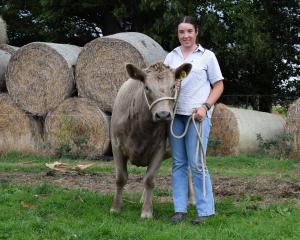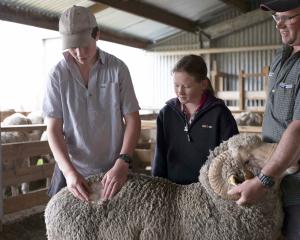
The 27-year-old participated in the inaugural Holstein Friesian New Zealand young breeder development programme and took part in a two-day introductory session in Hamilton last month.
The session covered topics including traits other than production, breeding values, the four pillars of governance and director responsibilities.
Other participants were Rachel Cox and John Wakelin, both of Canterbury, Karl Wood, of Manawatu, Cara How, of Horowhenua, and Sean Alexander, of Waikato.
She applied for the programme because it was too good an opportunity to miss.
"Programmes like this don’t come along very often so you’ve got to seize the opportunity."
Often people became board members despite lacking knowledge on governance or the process.
She hoped the programme would better prepare her for making a difference as a member on a board in the agricultural sector.
The programme schedule includes monthly online workshops with key board members in the sector.
Programme participants will attend another two-day session at the HFNZ annual meeting in Invercargill in June.
The participants will conclude the programme by delivering a presentation to the HFNZ board of directors in December.
Miss Morrison manages Haswell Farm, one of her family’s three self-contained dairy farms on Inch Clutha.
Inch Clutha is a flat island, sitting in the delta between the northern and southern branches of the Clutha River, downstream from Balclutha.

Miss Morrison milks 420 cows twice a day.
About 240 cows are registered Holstein Friesians and the rest of the herd includes some Shorthorn and Ayrshire.
She is targeting a production of 188,000kg of milksolids, or about 450kgMS per cow, which would be a record season.
A record season is achievable because it is her fourth season farming on Haswell Farm, including putting together a new herd.
Her milk production lifts slightly each year as she tweaks the farm system and improves the herd.
HFNZ general manager Cherilyn Watson said it was great to meet the participants in the programme at the introductory session.
"They are a great group of keen future leaders."
She would follow the progress of the six young breeders as they developed skills to contribute positively to the New Zealand dairy industry.
"The programme is targeted at young breeders, and aims to help participants develop skills outside of the show ring, particularly in the areas of governance and industry affairs."
Throughout this year, participants will attend workshops covering industry topics including understanding three-generation pedigree reports and bull catalogues, understanding the national breeding objectives and breeding values underpinning the New Zealand dairy industry, genomics, the New Zealand milk payment system and the impact of global financial fluctuations.
"The association sees this programme as a pathway to developing young breeders for board succession and to represent HFNZ across industry affairs in the future."















